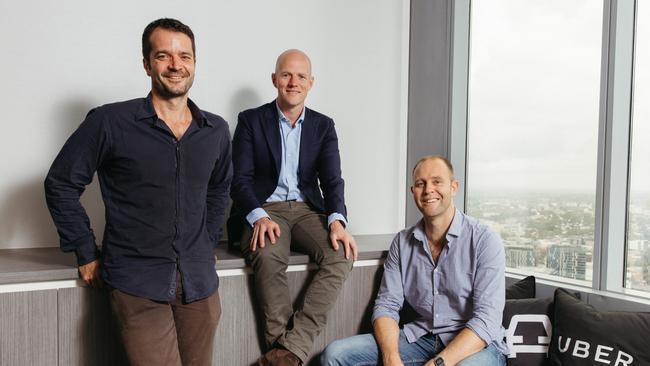Uber Carshare founder Will Davies on the struggle to convince wealthy people to share rides
One of the hardest parts of raising a funding round for this now acquired start-up was trying to convince rich people that the rest of the world didn’t mind sharing.

One of the biggest battles the Australian start-up founder behind Uber’s largest local acquisition has faced was trying to convince wealthy people the other half don’t mind sharing.
The year was 2015 and Will Davies, the founder of peer-to-peer car share start-up Car Next Door, was on the hunt for investors for a series A raise. It was no easy feat.
Mr Davies and his team approached 149 investors and just 38 were willing to even meet him. Ultimately no venture capital funds were invested.
“A lot of the issues we had in getting investors was that wealthy people just couldn’t even begin to imagine sharing out their car to a random person,” he told The Australian on Wednesday, from Blackbird’s Sunrise festival.
“We were trying to get our money out of wealthy people and they just couldn’t see it as being a good idea.”
Venture capitalists told him Car Next Door “wasn’t on their theme”, another didn’t like the fact the company sent out lockboxes to hold car keys because it would “slow you down and make it clunky” and another just didn’t like how US competitor Turo was faring at the time.
In the end, the start-up went down the angel investor path, finding 20 people who wanted to come on board with an average investment of $81,000.
Fast forward seven years to January 2022 and Car Next Door was acquired by US rideshare giant Uber, which quickly became the world’s largest rideshare service.
“There’s an element of every acquisition that is just painful. There’s just a lot of change that has to happen and that was certainly the case for me,” Mr Davies said, just shy of two and a half years after the acquisition.
But Uber did give the start-up breathing room, allowing it to operate independently at first, while Mr Davies reported directly to Uber’s general manager Dom Taylor.
After rebranding to Uber Carshare, Mr Davies launched pilot peer-to-peer rideshare platforms in Toronto, Canada, and Boston in the US.
“You know as well as me how Uber thinks, and the goal here is not to have a nice business just operating out of Australia,” he said. “They’re certainly very keen to take what we’ve built in Australia and expand it all around the world.”
The world’s share economy has grown sevenfold since Mr Davies’ 2015 struggle to raise capital, while companies such as Airbnb and Australian-founded pay-per-task platform Airtasker expanded across multiple markets.
“It’s just so interesting how over the last 12 years of our journey, we’ve gone from sharing your car being an incredibly weird thing to do to being actually quite commonplace among the younger generation,” he said.
“When we started Car Next Door, our goal was to get as many people carsharing as possible.
“The more people who car share, the less people need to buy cars and the purpose of it for me primarily was to reduce carbon emissions.”







To join the conversation, please log in. Don't have an account? Register
Join the conversation, you are commenting as Logout